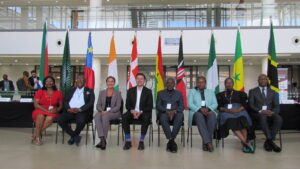
Forum in Tshwane House photo by Dimakatso Modipa
The City of Tshwane hosted six African Cities for the C40 Water Safe Cities Forum.
This is particularly important as it comes at a time where many municipalities in the country are facing water supply challenges.
The Executive Mayor of Tshwane, Cllr Cilliers Brink, officially open the three-day water forum on Tuesday, 16 April 2024.
The forum brought together African cities to discuss and exchange skills and knowledge on water security and management.
Participating cities will include Lagos, Nairobi, Accra, Dakar, Dar es Salaam, City of Ekurhuleni and City of Johannesburg.
The forum aims to empower African cities with a better understanding of their water security needs, priorities and collaborative opportunities to address supply challenges.
City of Tshwane Mayor Cilliers Brink opened the C40 Water Forum in Tshwane this morning and emphasised that people of Gauteng, including those of the City of Tshwane, use much more water than the national average.
He pointed out that South Africa as a whole is a water-scarce country and change of behaviour was needed to preserve water and avoid water crisis.
“C40 cities is a network of mega cities in the world and on the African continent there are 13 such cities, that are members of this network,” said Dorah Modise.
Officials of all those cities are here in Tshwane to engage on issues of water security as we as the C40 recognise that water is one of the commodities that gets negatively impacted by climate change and that it is critical for us as a developing country to bounce back and remain resilient to the impact of climate change,” she said.
She pointed out that due to climate change shortage of water and floods have become the norm worldwide.
She said the forum would be a great opportunity for peer learning as challenges faced by one country at any given time that very challenge may face the other city in the future.
“The purpose of this water forum is for the officials of different cities across the African continent to get together and share lessons regarding water resilience and safety and come up with solutions that are relevant to their respective cities,” Modise said.
Asked whether the City of Tshwane was wiñning the fight against the water crisis, Mayor Brink responded as follows: “The fight is going to be a long one and will take much more than a few days.”
Brink said the key thing is to find new sources of abstraction as the City was not abstracting water to capacity from the Roodeplaat and Rirtvlei dams,” he said.
” We also have to reduce water distribution losses like leaking pipes and incidents of water theft in the form of illegal connections,” said Brink.
He revealed that the city will need more infrastructure spend and this is where the partnership with the Danish government and C40 becomes valuable,” he said.
According to Brink, the partnership will give confidence to banks and other funders to grant funds for efforts to stop water crisis.
“We also have to change consumer behaviour as in most cases we use drinking water to do irrigation and many other activities which are not central to cooking, cleanliness and sanitation,” he said.
Brink said innovative solutions are needed to clear the sanitation backlog in the form of new technology such as bioremediation to better clean wastewater and make sure we don’t have water shortage.
He pointed out that asbestos pipes are no longer suitable as a conduit for water, this as asbestos is like paper machine, when one part collapses the other side collapses too.
“Our only option is to spend money on pipe replacements but because we don’t have the funds to replace the failing water infrastructure, we have to use technology to detect those parts of the infrastructure that are failing and replace them,” he said.
“My biggest concern is that here in Tshwane we spend more money on water tankers and rudimentary services than on pipe replacements,” he said.
“Water tankers are unsustainable, and we can’t continue on that route,” said Brink.
He said water tankers must be replaced with boreholes.
Brink complained that land invasions are making it impossible for the city to provide water to residents in some instances and the situation is made worse by the eviction laws of this country, which he said must be changed.
“We are at the moment working out a plan to deal with climate change in Africa as this continent has been hit the hardest by climate change,” Eldebeth Sondergaard from Royal Danish embassy. said.
“We have technical expertise, financial institutions and Danish companies in the water sector who are prepared to help us in our endeavour to get rid of water crisis in South Africa and the rest of the African continent,” she said.
Ambassador of the Central African Republic Andre Nzapayeke told Tshwane Talks that water crisis is a very important factor as water means life.
“Water crisis is the cause of poverty in Africa, but this issue can be resolved as we have the potential to solve it,” he said.
“We have minerals and forests which we can use to get rid of water crisis,” he said.
He said poverty has a negative impact on the environment in the form of destroying forests to get firewood.
“The African Union must put the matter of water crisis at the top of its agenda,” Nzapayake said.